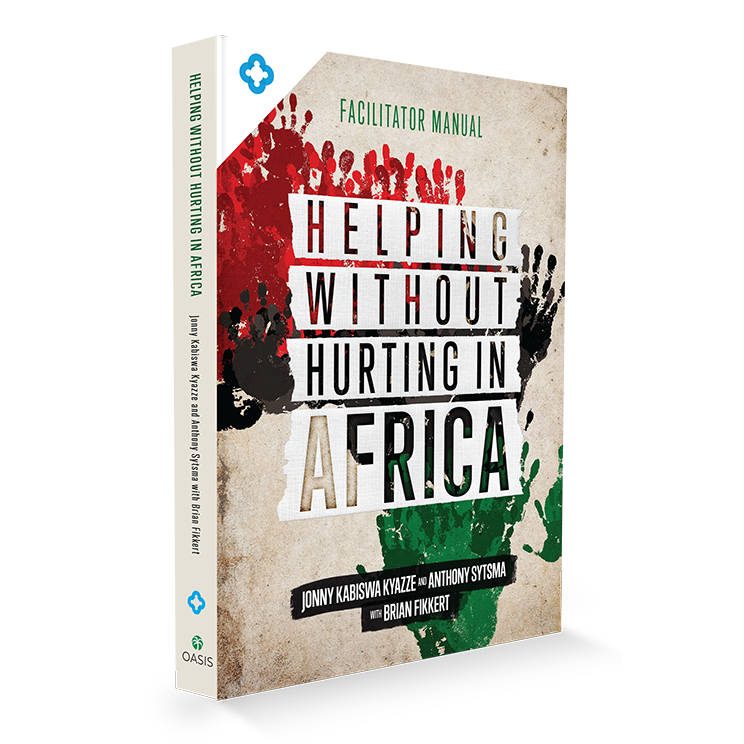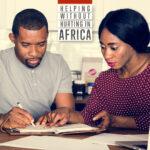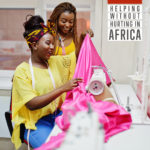This article is adapted from Helping Without Hurting in Africa, a Facilitator Manual which equips trainers to proclaim the gospel in both word and deed – changing mind-sets and helping apply biblical principles to care wisely and compassionately for people who are poor without unintentionally doing harm.
What is “work”? It is an activity involving mental or physical effort done to achieve a purpose or result. It is a means of earning income. We usually think of work as what people do from day to day in order to earn money. But it doesn’t always involve earning money. Sometimes it involves taking care of ourselves, or helping others, even making this world a better place. In this article we want to look at work as any activity done in order to support a person’s basic needs and the needs of their family.
Creation And Work Defined
Let’s look at what the Bible says about work in Genesis. From Genesis 2:1-3 we learn that God was the first one to work, creating the heavens and the earth before he rested. Rest is indicative of God being pleased with the results: “It was very good” (Genesis 1:31). If God worked, we should follow his example. Work is not a bad thing. It isn’t a punishment or a curse. In fact, it is a godly activity. God placed mankind in the garden to keep it (Genesis 2:15). He says, “Be fruitful and multiply and fill the earth and subdue it, and have dominion” (Genesis 1:28).
Out of all God’s creatures, only humans were given a job to do.
God clearly wanted Adam and Eve to work. It was a gift from him so that they could have meaningful lives. In fact, out of all God’s creatures, only humans were given a job to do. They were created with a purpose. They were to manage the Garden of Eden, rule over the animals, and fill the earth (Genesis 1:28-29). As God is the Creator, people who are made in his image also continue to create new things. People develop God’s world. People create culture, write songs, build houses and roads, cultivate fields, and create social institutions. We utilise God’s creation for our benefit and for God’s glory.
Of course, there is a problem with our work today. This problem also goes all the way back to Adam and Eve in the Garden.
The Fall And Work Frustrated
When Adam and Eve disobeyed God, sin came into the world and stained everything. The whole world became broken and corrupt. And God punished them for their sin. We call this punishment, “the curse.” For God cursed the ground because of sin (Genesis 3:17), meaning that it would only yield its fruit through pain and toil (Genesis 3:18-19). Even today, all people experience the consequences of humanity’s fall into sin. For not only farming but all work now has the potential to be stressful, or boring, or dangerous, or frustrating.
We must understand that work is still a gift even though it has become difficult. The same is true of childbearing. Childbearing is painful and difficult. But giving birth to children is still a beautiful gift from God. Work was cursed and made difficult, but it isn’t a curse in itself. Work is a godly activity, and it is one of the things God created us to do. In fact, recent research studies have shown that people who have work to do are far happier than those without. We need work. Even when Jesus returns and his kingdom is complete, it will continue.
All work now has the potential to be stressful, or boring, or dangerous, or frustrating.
When their work became difficult, did Adam and Eve become hopeless? No. Because God continued to bless them and be with them. Adam and Eve were able to work and provide for themselves, even outside the Garden of Eden. They were able to bear children and reproduce. God didn’t abandon humanity. He still provides for us through our work and continues to give us his blessings. He never ceases to care for mankind (Psalm 104:10-14).
God Invites Us to Imitate Him and Rest
God also set an example for mankind in resting. “So God blessed the seventh day and made it holy, because on it God rested from all his work that he had done in creation” (Genesis 2:3). For the Israelite people to follow God’s example, God gave them the gift of the Sabbath day showing that they no longer had to work like slaves in Egypt but could enjoy freedom and rest in the land of Israel. Today as Christians, we are also to follow God’s example by working six days and resting one day each week. Both work and rest are God’s gift to us.
While some of us disobey God in neglecting to work hard, others of us overwork.
While some of us disobey God in neglecting to work hard, others of us overwork and become too busy and this is hurting our families. Some of us don’t rest because we are chasing riches. Other times overworking is a sign of sinful pride. Perhaps we do too many different jobs and serve in too many volunteer positions. We don’t know how to say “no.” Most of us love the feeling of being important and needed. The result is a group of people doing way too much work, and another group of people without enough work opportunities. We must resist this attitude and realise God is in charge of the world; we cannot do everything ourselves. Additionally, resting shows that we trust God to provide for us. If we don’t rest, it may mean that we lack faith in God’s promises.
Common Misconceptions
Some people in Africa view work as a curse or a punishment. On occasion school teachers give pupils certain work as a punishment for disobedience. Common punishments could be cutting grass using a slasher tool, digging an anthill, or cleaning the dining hall. But this is work many people do to earn a living and as a result we can begin to associate such kinds of work with punishment.
Christians have at times misunderstood the Bible and viewed work as a result of sin. As a consequence some people view work as a burden, and try to only do enough so that they can survive. This false belief has caused a lot of materially poor people to remain in their poverty and others to become materially poor (of course there are other factors that can cause people to be materially poor even if they work hard).
Misunderstandings around work have caused a lot of materially poor people to remain in their poverty.
How to Empower Others
We need to reconcile our relationship with God’s creation and understand that work is a blessing. In this way we can find meaningful work to do in God’s world which can financially support us and our families. Helping people to find work can include listening and counselling them, encouraging them to use their assets and skills, and sometimes it means educating and training people in new skills so that they have more opportunities.
We must view work as a gift not a burden. Helping others find work must not be because we are tired of being generous in our financial assistance. Instead, we help others find and do work so that they can be the people God created them to be—people made in God’s image who work just like God does. And before we can help others, we need to begin with ourselves, making sure that we view work as a gift and are doing it for the glory of God.
We can look to the example of Otim (name changed). In one of my (Jonny) previous workplaces, Otim worked as a security guard. He would dress up nicely for his work, put a smile on his face, greet everyone, and he was always willing to help anyone. All the other staff appreciated him. At one point we had to lay off staff, but Otim was among the first management recommended to be retained. Some people do not want to admit the type of work they do, but Otim would happily introduce himself as a guard with pride. He did his work with joy, integrity, and commitment. Truly Otim viewed his work as a meaningful gift from God!
Questions for Further Reflection
- In my church ministry, do I make sure to preach regularly about work being a gift from God?
- Am I following God’s example of working but neglecting to follow God’s example of resting? What sinful attitude might be behind my refusal to rest?
- As my church ministers to materially poor people, are we giving and helping in a way that encourages people to value working?
- Even though work is often difficult, how do you see God blessing you and others through your work?

Helping Without Hurting in Africa provides readers with foundational concepts and tools in Christ-centered poverty alleviation and doubles as a ready-to-use facilitator manual that helps participants:
- Grow in their relationships with God, others, self, and the rest of creation.
- Gain a new focus on the kingdom of God in their ministries.
- Renew their love and compassion for the materially poor.
- Obtain knowledge about how to help low-income individuals and communities more wisely.
- Empower churches and ministries to bring lasting change, starting with their own resources.
Contact Oasis Regional Directors to order Helping Without Hurting in Africa: Facilitator Manual:
- Regional Director East Africa: WhatsApp: +27 79 572 4877
- Regional Director West Africa: WhatsApp +234 809 111 1184
You can also visit the Oasis website, for more ordering information. Visit the Chalmers Center to download both a free sample of the Facilitator Manual as well as the entire Participant Manual.















